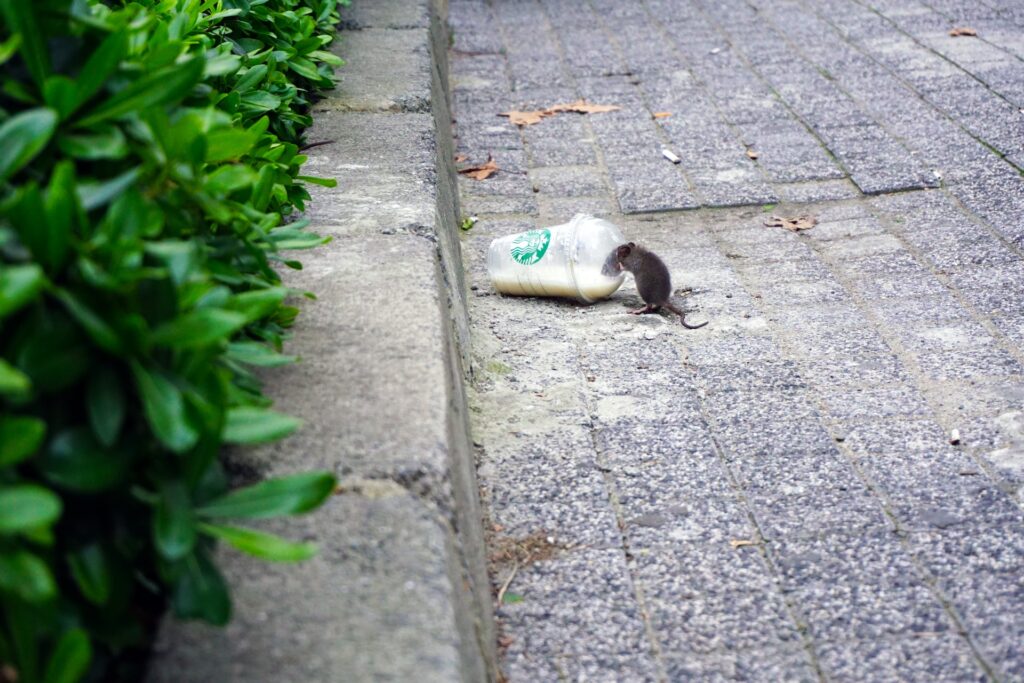People often seek natural ways to repel mice, and lavender is a popular choice believed to discourage mice with its pungent smell. The scent of lavender, enriched with compounds like linalool and linalyl acetate, is thought to be overpowering for mice. By using drops of lavender oil or planting lavender, some homeowners hope to deter mice and keep their homes free of harsh chemicals.
Lavender’s soothing aroma to humans may be unpleasant to rodents, and when combined with other strategies like sealing holes in walls and maintaining clean spaces, it can help keep mice at bay. However, for severe infestations, more robust pest management solutions may be necessary, including snap traps, glue traps, or even professional pest control.
The Battle Against Rodents: Natural vs Chemical Repellents
When considering how to repel mice, homeowners are often faced with choosing between natural deterrents and chemical repellents. While some prefer avoiding the use of harsh chemicals, others may find them necessary for persistent pest problems. Natural options, like essential oils and plant mint, offer a less invasive approach, but their effectiveness can vary. In contrast, chemical repellents promise a more potent defense against rodent invasions but come with concerns about safety and environmental impact.
Lavender’s Role in Keeping Mice at Bay
Among natural options to repel mice, lavender is a favored choice. Its distinct scent works to discourage mice, as their tiny noses find the aroma to be too potent. By strategically placing drops of lavender oil in areas where mice frequent, many have found success in maintaining a rodent-free home. The goal is to create a barrier that keeps mice at bay without resorting to more aggressive measures.
How Other Essential Oils Stack Up
Aside from lavender, other essential oils like eucalyptus oil, citronella oil, and lemon oil have also been used to repel mice. Eucalyptus oil repels mice with its strong scent, while citronella oil is known for its ability to ward off various pests. Lemon oil’s citrus scent is another natural deterrent that can help keep your living space free from unwanted visitors. However, in cases of severe infestations, these oils may not suffice, and seeking professional pest control could become necessary.
When to Consider Professional Pest Control
While natural methods can be effective, there are times when pest problems escalate beyond what home remedies can handle. If you’ve tried various approaches and still find signs of mice, or if the issue repeats despite your best efforts, it may be time to call in professional pest control. These experts can provide a comprehensive plan to address the problem, using their knowledge and tools to ensure your mouse problem is resolved thoroughly and safely.

The Potency of Lavender Oil Against Mice
Lavender oil, extracted from the leaves of the plant, has properties that can discourage mice and help keep them at bay. The scent that mice find unpleasant is due to the oil’s potent compounds, which are effective in deterring these rodents. While the leaves of the peppermint plant are also known for their repellent qualities, lavender oil holds its own as a natural option to repel mice.
Sensory Impact – How Mice React to Lavender
The potent aroma of lavender can repel mice effectively due to their keen sense of smell. Mice rely on this sense to detect potential dangers in their environment. By introducing lavender as a mouse repellent, such as dried lavender sachets or sprinkling lavender around the perimeter, you can disrupt their comfort and discourage them from settling in. Some even mix cayenne pepper with lavender to enhance the repellent effect, making the environment crucial for keeping mice at a distance.
Creating a Lavender Barrier – Practical Applications
To utilize the lavender scent as a barrier against mice, a spray bottle filled with a mixture of water and lavender oil can be used. Simply spray the mixture in areas of concern, and repeat this process regularly to maintain the repellent barrier. The lingering scent of lavender will help deter mice and contribute to a rodent-free environment.
Mixing a Lavender Oil Spray
For a homemade natural mouse repellent, fill a spray bottle with water and add several drops of lavender oil. Shake the mixture well and apply it to areas where mice are likely to enter or have been observed. The lavender scent will act as a deterrent, and for best results, homeowners should repeat this process frequently to ensure the scent remains potent and effective.
Distributing Lavender With Cotton Balls
Lavender oil can also be applied using cotton balls. Simply add a few drops of the oil to each cotton ball and distribute them in areas prone to mouse activity. The concentrated scent will help to repel mice, and the cotton balls can be easily replaced or refreshed with more oil as needed to maintain their efficacy.

Preventive Measures to Enhance Lavender’s Efficacy
While lavender plants and their derivatives like oil and sachets are used to repel mice, incorporating other preventive measures can enhance their efficacy. A multi-faceted approach that includes home maintenance and strategic plant lavender placement ensures that mice hate the smell of lavender and will think twice before entering your space.
Home Maintenance to Discourage Mouse Intrusions
Regular home maintenance is essential in the fight against mice. Essential oils, including lavender, can be a part of this routine, but they are most effective when complemented by other efforts to secure the home against these pests.
Sealing Entry Points With Caulk and Steel Wool
Mice can squeeze through the smallest of gaps, making it crucial to seal any potential entry points with caulk and steel wool. These materials are effective in blocking access and discouraging mice from trying to enter. It’s a simple yet vital step in ensuring your home remains mouse-free.
The Importance of Clean Spaces and Airtight Food Storage
Maintaining clean spaces and using airtight containers for food storage are critical measures to prevent attracting mice. By eliminating food sources and reducing clutter, you remove the incentives for mice to invade your home, further enhancing the repellent effect of lavender and other natural deterrents.
The Science Behind the Scent: Analyzing Lavender’s Effectiveness
Researchers have been curious about whether the scent of lavender can effectively repel mice. While folks have long suggested that mice hate the smell of lavender, it’s crucial to examine scientific studies to understand the true impact. Lavender plants produce a strong fragrance that is thought to be off-putting to rodents, leading many to plant lavender around their homes. However, the effectiveness of lavender can vary based on several factors, including the concentration of the scent and how it is distributed.
Concentration Matters – The Strength of Lavender Oil
The effectiveness of lavender oil as a rodent repellent may significantly depend on its concentration. A higher concentration can discourage mice more effectively, as they find the intense aroma unpleasant. Interestingly, the pleasant aroma that humans enjoy, much like the smell of peppermint, can be overwhelming to the sensitive noses of mice. Therefore, using a strong lavender oil solution might be key to keeping these pesky critters at bay.
Comparative Analysis: Lavender vs Other Repellents
When comparing lavender to other natural repellents, it is important to consider the preferences of mice. While lavender has a reputation for being disliked by mice, other essential oils, such as peppermint and citronella, have also been used with varying degrees of success. Each oil has its own unique properties that may affect how well it repels mice, and some may work better in different environments or against different species of rodents. Check more about this here.
Comprehensive Rodent Repulsion Techniques
To maximize the effectiveness of lavender as a mouse deterrent, it’s recommended to use a multifaceted approach. This includes maintaining a clean household, sealing potential entry points, and combining lavender with other repellent strategies. For example, using a spray bottle filled with lavender oil solution can help spread the scent throughout areas where mice may be lurking, adding an additional layer of protection against these unwanted guests.
Lavender and Its Complementary Repellents
Combining lavender with other natural repellents can enhance its rodent-repelling properties. Mice hate the smell of lavender, and when it is used alongside other strong scents, the mixture can be even more effective in keeping rodents away.
The Synergy of Lavender with Mint and Sage
Lavender, when used in conjunction with mint and sage, can create a powerful deterrent against mice. The strong scents of these herbs are believed to be particularly offensive to rodents. By filling a spray bottle with a mixture of lavender, mint, and sage oils, you can create a natural repellent that not only keeps mice at bay but also adds a refreshing fragrance to your home.
Understanding Which Plants Attract Mice to Avoid Them
While certain plants like lavender are known to repel mice, others may inadvertently attract them. It’s important to be aware of which plants could be providing a food source or nesting material for rodents. By avoiding these plants, you can decrease the chances of mice considering your home an inviting habitat.

Final Thoughts on Utilizing Lavender as a Mouse Deterrent
After exploring the various ways lavender can be used to deter mice, it’s clear that this plant and its oil can be part of an effective rodent control strategy. The key is to use lavender strategically and consistently, ensuring areas prone to mice exposure are treated with the scent.
A Summary of Lavender’s Repelling Properties
Lavender’s reputation as a rodent repellent is backed by its strong scent, which is disliked by mice. By using lavender oil in a spray bottle, or placing lavender sachets in areas where it’s present, you can create an environment that is less appealing to these pests. Additionally, incorporating 8 to 10 drops of oil in places where mice frequent, such as crawl spaces, can serve as a natural deterrent. Lavender is not only a mice repellent but also contributes to the aesthetic and ambiance of a home, with its culinary and medicinal benefits being a bonus for family members.
Making an Informed Decision on Mouse Repellents
Choosing the right mouse repellent involves understanding the behavior of these creatures. Mice have a keen sense of smell, which can be overwhelmed by certain scents that mice dislike. Soaking cotton balls in lavender oil and placing them in areas where mice and rats traverse can be an effective way to repel them. Additionally, natural repellents like garlic cloves can complement your efforts. However, if you’re dealing with a larger mouse infestation, it might be time to contact a pest control company for professional assistance.

